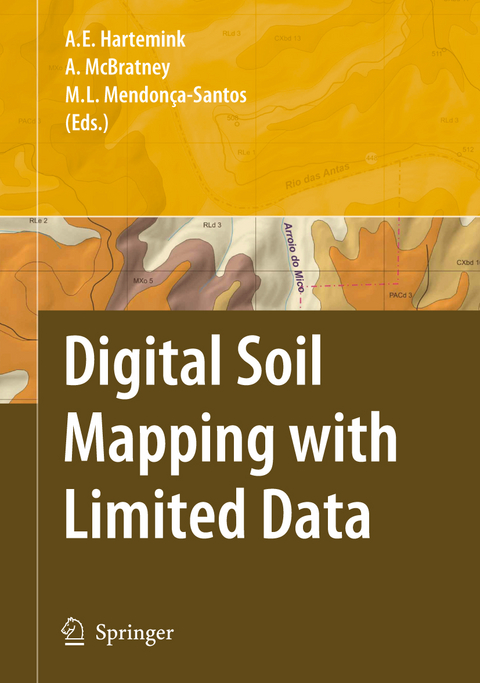
Digital Soil Mapping with Limited Data
Springer (Verlag)
978-90-481-7925-1 (ISBN)
Digital Soil Mapping: A State of the Art.- Digital Soil Mapping Technologies for Countries with Sparse Data Infrastructures.- A New Global Demand for Digital Soil Information.- Development and Application of Digital Soil Mapping Within Traditional Soil Survey: What will it Grow Into?.- Soil Map Density and a Nation’s Wealth and Income.- Dealing with Limited Spatial Data Infrastructures.- Digital Soil Mapping as a Component of Data Renewal for Areas with Sparse Soil Data Infrastructures.- Challenges to Digital Soil Mapping.- Mapping Potassium Availability from Limited Soil Profile Data in Brazil.- GIS as a Support to Soil Mapping in Southern Brazil.- Experiences with Applied DSM: Protocol, Availability, Quality and Capacity Building.- Towards a Data Quality Management Framework for Digital Soil Mapping with Limited Data.- Demand-Driven Land Evaluation.- Digital Soil Mapping – Methodologies.- Diffuse Reflectance Spectroscopy as a Tool for Digital Soil Mapping.- Digital Soil Mapping at a National Scale: A Knowledge and GIS Based Approach to Improving Parent Material and Property Information.- 3D Modelling of Geology and Soils – A Case Study from the UK.- Landsat Spectral Data for Digital Soil Mapping.- From a Large to a Small Scale Soil Map: Top-Down Against Bottom-Up Approaches.- An Approach to Removing Uncertainties in Nominal Environmental Covariates and Soil Class Maps.- Digital Soil Mapping Using Logistic Regression on Terrain Parameters for Several Ecological Regions in Southern Brazil.- Purposive Sampling for Digital Soil Mapping for Areas with Limited Data.- Assessment of Land Degradation Using NASA GIMMS: A Case Study in Kenya.- Digital Soil Mapping – Examples.- Spatial-Temporal Changes in Land Cover, Soil Properties and Carbon Stocks in Rio de Janeiro.-Broad-Scale Soil Monitoring Through a Nationwide Soil-Testing Database.- Online Soil Information Systems – Recent Australian Experience.- Digital Soil Mapping Using Legacy Data in the Eden Valley, UK.- Delineating Acidified Soils in the Jizera Mountains Region Using Fuzzy Classification.- Incorporating Legacy Soil pH Databases into Digital Soil Maps.- The Digital Terrain Model as a Tool for Improved Delineation of Alluvial Soils.- Building a Digital Soil Data Base of the Solimões River Region in the Brazilian Central Amazon.- Enhancing the Use of Remotely-Sensed Data and Information for Digital Soilscape Mapping.- The Use of GIS and Digital Elevation Model in Digital Soil Mapping – A Case Study from São Paulo, Brazil.- Geomorphometric Attributes Applied to Soil-Landscapes Supervised Classification of Mountainous Tropical Areas in Brazil: A Case Study.- Digital Soil Mapping of Soil Properties in Honduras Using Readily Available Biophysical Datasets and Gaussian Processes.- Digital Mapping of Soil Classes in Rio de Janeiro State, Brazil: Data, Modelling and Prediction.- Priorities in Digital Soil Mapping.- Synthesis and Priorities for Future Work in Digital Soil Mapping.
| Vorwort | Robert J. Ahrens |
|---|---|
| Zusatzinfo | 55 Illustrations, color; 54 Illustrations, black and white; XXIV, 446 p. 109 illus., 55 illus. in color. |
| Verlagsort | Dordrecht |
| Sprache | englisch |
| Maße | 155 x 235 mm |
| Themenwelt | Naturwissenschaften ► Biologie ► Ökologie / Naturschutz |
| Naturwissenschaften ► Geowissenschaften ► Geografie / Kartografie | |
| Naturwissenschaften ► Geowissenschaften ► Geologie | |
| Naturwissenschaften ► Geowissenschaften ► Geophysik | |
| Technik | |
| Weitere Fachgebiete ► Land- / Forstwirtschaft / Fischerei | |
| ISBN-10 | 90-481-7925-4 / 9048179254 |
| ISBN-13 | 978-90-481-7925-1 / 9789048179251 |
| Zustand | Neuware |
| Haben Sie eine Frage zum Produkt? |
aus dem Bereich


